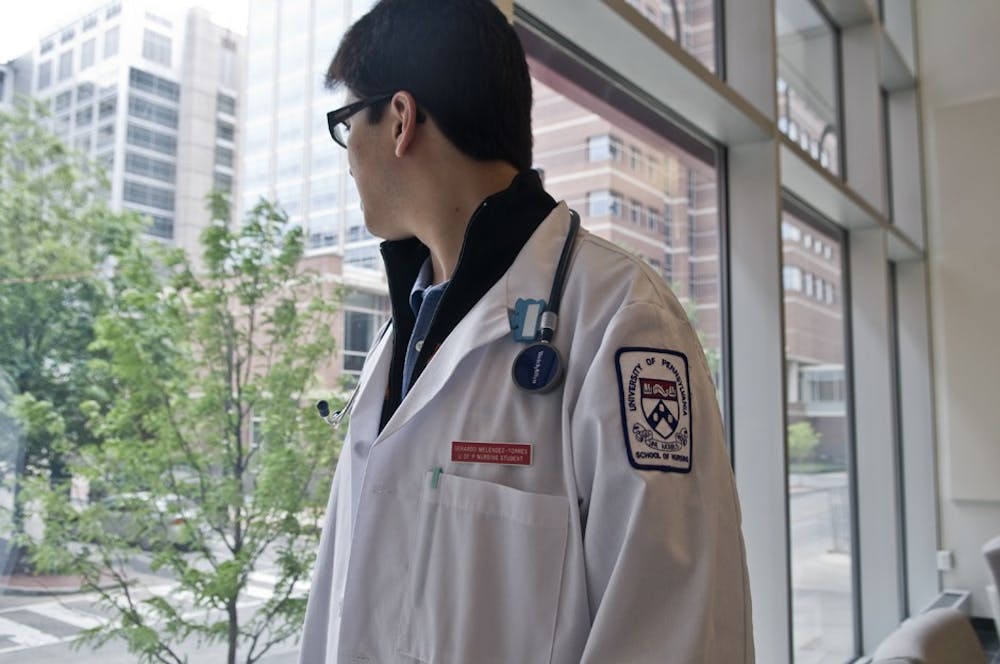For male nurses at Penn, the horizon is changing.
Despite pervasive stigmas casting nursing as a female field, Penn’s small number of male nurses has begun to grow.
At Penn, males make up a mere 9.4 percent of the Nursing School’s student body. This percentage, however, is higher than the national average of approximately six percent in the workforce, but much lower than the number of males in the other three Penn schools.
Even so, males are joining the Nursing School in record numbers. With 18 male students, the class of 2013 has the largest numbers of males in Penn Nursing history.
“If you look at trends, we are becoming more attractive to male BSN [bachelor of science in nursing] students. We admitted 19 men for the class entering September 2009 and 18 matriculated. For the class coming in September of 2010, we have admitted 15 men,” said Kathleen McCauley, Nursing associate dean for academic programs.
In a largely female-dominated field, Penn’s increase is significant. Nationally, females nurses outnumber men by more than 15 to one, according to the 2008 National Sample Survey of Registered Nurses. As a result, Nursing and Healthcare Management freshman Jeff Rollman said, stereotypes tend to associate nursing with females.
This association can be limiting, Nursing senior and President of MANUP — a group that supports male nurses — Stuart Davidson wrote in an e-mail.
“Male nurses and female nurses all have the same roles and responsibilities. By defining nursing as field for women only, it is detrimental to all nurses,” he wrote.
- Men make up 9.4 percent of the Nursing School’s student body - The Nursing class of 2013 includes 18 men, the highest number in the school’s history - Fifteen men were admitted to the Nursing class of 2014 - Six percent of the national nursing workforce is male - Female nurses outnumber male nurses more than 15 to one
Aliza Keller, a freshman in Nursing, said the stigma is a “vicious cycle” because men continue to stay away from the career and it remains a female-dominated field.
In addition, people often have misconceptions about the role of nurses in the medical field.
“A lot of people think of nurses as changing bedpans and changing sheets and doing menial tasks,” Rollman said. “It isn’t like that in reality.”
Nurses, according to Rollman, are heavily involved in patient interaction and care, working with doctors to administer drugs and teach patients about their health.
Steven Cabrera, a Nursing freshman, attributed the increase in male nurses to the rising respect and influence of men in the field.
“More and more there is the recognition that it doesn’t just have to be a female field,” Cabrera said. “People realize that doctors and nurses are equal, and that it is simply a matter of preference.”
As a result of the increase in male nursing students, the stigma is changing, Cabrera said.
Other students think that it is “cool” that Cabrera is pursuing a Nursing degree, he said. The degree “commands respect.”
In choosing between the pre-med track and nursing, Rollman opted for the nursing trajectory because he wanted to start work after college and “not worry about lawsuits and small details.”
As opposed to doctors, who go through an eight-year track, a nurse can graduate from college and immediately begin a job.
This is largely because the health care sector of the economy has continued to grow despite the recession, according to the U.S. Bureau of Labor Statistics. There has been a concurrent nursing shortage that is projected to grow.
As such, nursing is an appealing and growing career option for men, as it is an open job-market with stability and “decent pay,” Rollman said. Similarly, Davidson wrote “as the nursing shortage grows nationwide, I think more men will be attracted into the profession due to the wide array of opportunities.”
Cabrera was attracted to nursing for another reason — he sees the field as “interactive.”
“In my opinion, nurses are more social and involved in the medical field than doctors,” Cabrera said. “That’s what I want to do — I want to be involved.”
Of the male nurses at Penn, nearly half are in the joint Nursing and Wharton program, Nursing and Healthcare Management.
The rigorous program is mostly male and differs from Nursing in that participants are required to take Wharton core classes in addition to the Nursing requirements.
According to Rollman, a NHCM student, the program is split between those who pursue careers in business and those who pursue health care.
Both Cabrera and Rollman intend to work as nurses after college and potentially move on to graduate school after some work experience.
This is in line with trends in the nursing workforce, as males tend to rise through the ranks and pursue master’s degrees more often than female nurses.
“Although there are far more females than males in the nursing field, the ideas and leadership of the profession are being influenced strongly by men,” Davidson said. “The percentage of men in the field is only a number and is not indicative of the influence men have within nursing,”
According to Keller, advance practice nursing is a profitable profession that allows for a lot of autonomy. “It’s going to be in high demand,” she said.
“Why wouldn’t a guy go into nursing?”
- Men make up 9.4 percent of the Nursing School’s student body - The Nursing class of 2013 includes 18 men, the highest number in the school’s history - Fifteen men were admitted to the Nursing class of 2014 - Six percent of the national nursing workforce is male - Female nurses outnumber male nurses more than 15 to one



